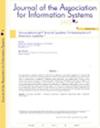和我竞争?网络游戏化比赛对运动行为的影响
IF 5.5
3区 管理学
Q1 COMPUTER SCIENCE, INFORMATION SYSTEMS
引用次数: 0
摘要
在线游戏化竞争利用竞争作为核心游戏化设计元素,从可穿戴设备和移动应用程序中获得支持,以集成的方式跟踪竞争活动和可视化信息,以塑造用户的运动行为。然而,对于网络游戏化竞争如何培养不同类型个体的运动行为,我们仍然缺乏清晰的认识。我们考虑到运动行为的个体差异,并根据适应的频率、频率和使用关键运动行为指标的货币价值框架,将锻炼者分为三组(积极、适度和不积极)。将在线游戏竞争理论化为社会和时间自我比较的一种手段,我们从两种不同的比较模式(成绩排名和成绩差距)以及参与者与其社会比较对象(即竞争强度)的关系中检验了成绩反馈对不同锻炼者群体的运动行为的影响。我们的研究结果表明,在线游戏化竞争对不同锻炼者群体的运动行为有不同的影响。具体来说,我们发现积极的运动表现改善对积极和适度的锻炼者更有激励作用,而相对于历史运动表现水平的运动表现恶化对不运动的锻炼者更令人沮丧。成绩排名对中度和非积极锻炼者的影响更为显著,竞争强度对积极锻炼者的运动行为有更强的正向影响。在竞争强度对中度和非运动者的影响方面,移动健身应用中认知能力的增强效应更为显著。我们得出了游戏化信息系统的理论和实践意义,该系统将竞争作为塑造不同锻炼者群体中个体运动行为的核心设计元素。本文章由计算机程序翻译,如有差异,请以英文原文为准。
Compete with Me? The Impact of Online Gamified Competition on Exercise Behavior
Online gamified competition utilizes competition as a core gamification design element with affordances from wearables and mobile applications to track competitive activities and visualize information in an integrated way to shape users’ exercise behaviors. However, a clear understanding of how online gamified competition cultivates exercise behaviors in different types of individuals is still lacking. We take into account the individual differences in exercise behaviors and categorize exercisers into three groups (active, moderate, and inactive) based on an adapted recency, frequency, and monetary value framework using key exercise behavior metrics. Theorizing online gamified competition as a means of social and temporal self-comparison, we examine the effect of performance feedback from two distinct modes of comparison (performance rankings and performance gap), and participants’ relationships with their social comparison referents (i.e., rivalry intensity), on the exercise behaviors of different exerciser groups. Our results reveal that online gamified competition has differential effects on exercise behaviors across different exerciser groups. Specifically, we find that positive performance improvements are more motivational for active and moderate exercisers, while performance deterioration relative to historical exercise performance level is more discouraging for inactive exercisers. Performance rankings exhibit a more salient effect for moderate and inactive exercisers, and rivalry intensity has a stronger positive effect on active exercisers’ exercise behavior. The strengthening effect of awareness affordances in mobile fitness apps is more notable with regard to the impact of rivalry intensity on moderate and inactive exercisers. We derive theoretical and practical implications of gamified information systems that use competition as a core design element for shaping the exercise behavior of individuals in different exerciser groups.
求助全文
通过发布文献求助,成功后即可免费获取论文全文。
去求助
来源期刊

Journal of the Association for Information Systems
工程技术-计算机:信息系统
CiteScore
11.20
自引率
5.20%
发文量
33
审稿时长
>12 weeks
期刊介绍:
The Journal of the Association for Information Systems (JAIS), the flagship journal of the Association for Information Systems, publishes the highest quality scholarship in the field of information systems. It is inclusive in topics, level and unit of analysis, theory, method and philosophical and research approach, reflecting all aspects of Information Systems globally. The Journal promotes innovative, interesting and rigorously developed conceptual and empirical contributions and encourages theory based multi- or inter-disciplinary research.
 求助内容:
求助内容: 应助结果提醒方式:
应助结果提醒方式:


